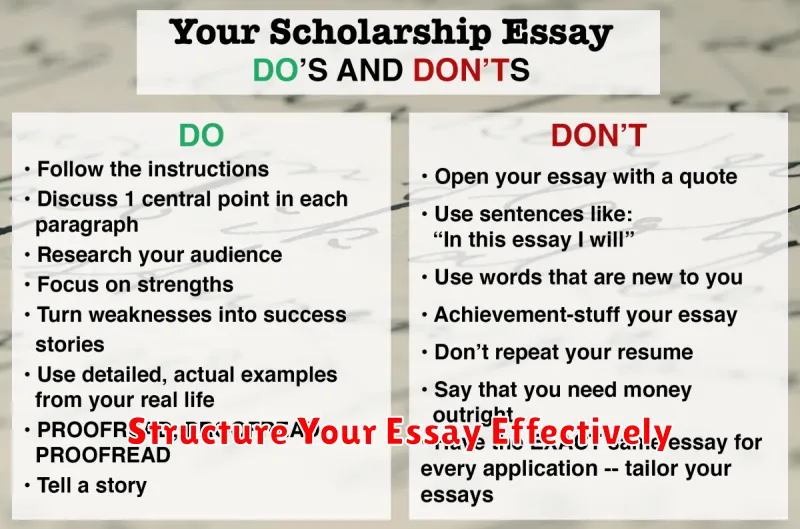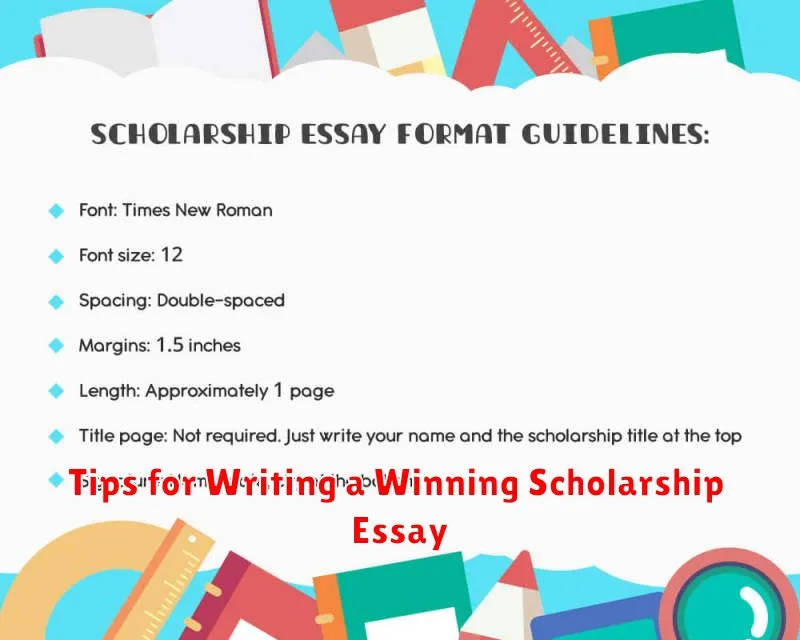Applying for scholarships can be a daunting task, but crafting a winning scholarship essay can significantly increase your chances of securing financial aid. A compelling and well-written essay can set you apart from other applicants, showcasing your unique qualities, aspirations, and potential. This article will provide valuable tips for writing a scholarship essay that captures the attention of selection committees and ultimately helps you achieve your academic and career goals. Learn how to effectively structure your scholarship essay, highlight your strengths, and address the prompt effectively to create a truly impactful and memorable submission. From brainstorming ideas to polishing your final draft, these tips will guide you through the entire process of creating a winning scholarship essay.
Writing a winning scholarship essay requires careful planning, thoughtful reflection, and strong writing skills. By following these proven tips, you can transform your application from ordinary to extraordinary. Discover how to craft a compelling narrative, showcase your personality, and demonstrate your commitment to your chosen field of study. Whether you are applying for a merit-based scholarship, a need-based scholarship, or a scholarship specific to your major, these tips will empower you to write a winning scholarship essay that effectively communicates your value and potential to the selection committee. This article will delve into the key elements of a successful essay, including understanding the prompt, structuring your response, developing a compelling thesis statement, and showcasing your unique qualifications.
Understand the Prompt Clearly
Before you even begin drafting your essay, carefully read and understand the prompt. Deconstruct the question to identify the key themes and expectations.
What are the scholarship providers looking for? What message do they want to convey? A thorough understanding of the prompt will guide your writing and ensure your essay addresses the specific criteria.
Identify keywords within the prompt. These words often hint at the core values and focus of the scholarship. Use a highlighter or underline these words to keep them top of mind as you write.
Showcase Your Uniqueness
Scholarship committees read countless essays. Stand out by showcasing what makes you unique. Don’t just list accomplishments; reflect on experiences that have shaped you. What are your passions, values, and aspirations? How have these influenced your academic and personal journey?
Consider what perspectives you bring that others might not. This could stem from your background, cultural experiences, or personal challenges overcome. Authenticity is key. Let your personality shine through your writing.
Structure Your Essay Effectively

A well-structured essay is crucial for conveying your message clearly. Organize your thoughts logically to create a compelling narrative. Begin with a captivating introduction that grabs the reader’s attention and clearly states your main argument.
Develop your argument in the body paragraphs, providing specific examples and evidence to support your claims. Each paragraph should focus on a single idea, contributing to the overall coherence of your essay. Ensure a smooth transition between paragraphs.
Conclude your essay with a strong summary of your main points and a restatement of your thesis. This leaves a lasting impression on the reader and reinforces the key takeaways of your essay.
Use Real Examples and Stories
Show, don’t just tell. Instead of simply stating you’re a hard worker, recount a specific instance where you demonstrated this trait. Did you overcome a challenging obstacle? Did you dedicate extra time to a project? A compelling story brings your qualities to life.
Relate your experiences to the scholarship’s purpose. Choose examples that align with the scholarship committee’s values and goals. If the scholarship emphasizes leadership, share a story where you successfully led a team or initiative.
Avoid Clichés and General Statements
Scholarship committees read hundreds, even thousands, of essays. Avoid overused phrases like “I’ve always dreamed of…” or “I want to make a difference.” These clichés make your essay sound generic and unmemorable.
Instead of general statements, focus on specific examples and anecdotes that demonstrate your qualities. Show, don’t tell. Replace vague claims with concrete details that highlight your unique experiences and perspectives. This will make your essay stand out and leave a lasting impression.
Tailor the Essay to the Scholarship
A winning scholarship essay is not a one-size-fits-all document. Carefully review the scholarship’s purpose and criteria. Identify the specific qualities, skills, or experiences the scholarship committee seeks.
Align your essay with these requirements. Highlight the aspects of your background that directly address their stated priorities. Avoid generic statements and instead, showcase how your unique attributes make you a deserving candidate for this particular scholarship.
Edit and Proofread Carefully
Thorough editing and proofreading are crucial for a winning scholarship essay. Carefully review your essay for clarity, conciseness, and grammatical accuracy.
Look for any awkward phrasing, repetitive sentences, or unclear ideas. Ensure your essay flows logically and effectively communicates your message.
Check for spelling, punctuation, and grammar errors. Even small mistakes can detract from the overall quality of your essay. Consider asking a friend or teacher to proofread your work for a fresh perspective.
Ask for Feedback
Once you’ve completed a draft of your essay, it’s crucial to seek feedback from others. Fresh eyes can catch errors you may have missed and offer valuable perspectives on the clarity and impact of your writing.
Ask trusted teachers, mentors, or advisors to review your essay. Provide them with the scholarship prompt so they can assess how well your essay addresses the specific requirements. Be open to constructive criticism and use their feedback to refine and strengthen your essay.
Stay Within the Word Limit
Scholarship committees establish word limits for a reason. Adhering to these limits demonstrates your ability to follow instructions and write concisely. Respect the word count. Going over the limit, even by a few words, can give a negative impression. Conversely, a significantly shorter essay might suggest a lack of effort or sufficient content.
Carefully review the application guidelines and note the specific word count or range. Use a word processing program to track your essay’s length throughout the writing process. This prevents unnecessary rewriting and editing later.
Submit Before the Deadline
Meeting the scholarship deadline is crucial. Late submissions are rarely accepted. Double-check the exact date and time, noting any time zone differences if applicable. Submitting early allows time to address unexpected technical issues and demonstrates your organizational skills.
Plan to complete your essay a few days before the deadline. This provides valuable time for proofreading and making final revisions, ensuring you present your best work.

